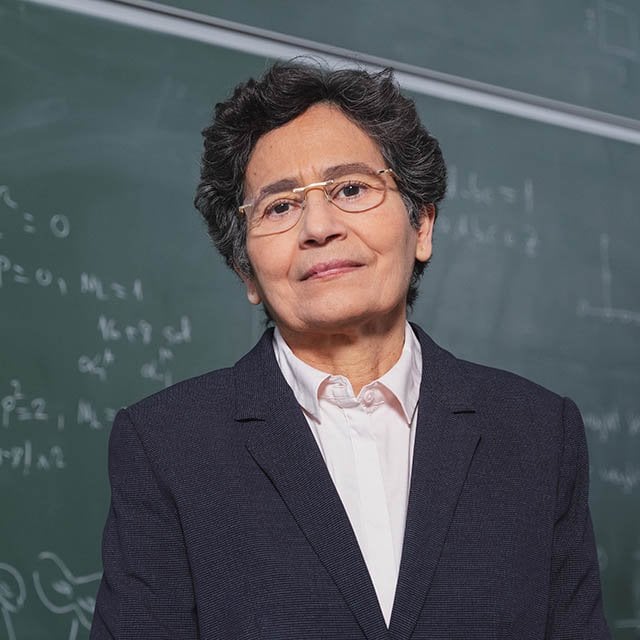Professor Anamaría Font
Latin America and the Caribbean – Physics

Pioneering theories to uncover the structure of the universe
Professor Anamaría Font is recognised for her work in theoretical particle physics, with a particular focus on developing the theory of superstrings whose basic building blocks are really strings, like those of a guitar This describes, in a unified and consistent way, the elementary particles of nature, which are the ‘notes’ produced by the vibrating strings, as well as their fundamental interactions. Her research has provided a deeper knowledge of the consequences of the theory for the structure of matter and quantum gravity, which are also relevant to the description of black holes and the first moments after the big bang.
Superstrings propagate in ten dimensions, but we can only detect four (time, length, width, and height). Professor Font has contributed to establishing phenomenological implications of superstrings by constructing and analysing models in which the six extra dimensions are hidden in very tiny compact spaces. A further highlight is her introduction of the key notion of S-duality, was pivotal for the developments that led to the second-string revolution in 1995.
A life of dedication to science and education
Explaining the world around us has been a lifelong interest for Professor Font. As a child, she enjoyed mixing substances and watching the reactions. She was fascinated by chemistry and physics at secondary school, where she had highly supportive and enthusiastic teachers, mostly women. “I found it amazing that one could explain nature with formulas and universal laws,” she says. “I vividly remember this desire to learn and discover.” And as a senior scientist, she has been active in continuing the tradition of scientific tuition, teaching mathematics and physics in Venezuela and other Latin American countries, while also co-organising scientific activities.
“Science and education are the basic pillars of sustainable development, and I feel proud to have devoted my career to both endeavours,” she says. “I would like to solve unanswered questions such as the origin of the pattern of masses of elementary particles, as well as the nature of the dark matter and energy that make up most of the universe – and ultimately, to develop a theory that underlies all physical phenomena. I am convinced of the value of this research and its potential to lead to future applications.”
Professor Fontalways relishes building compelling arguments, fitting details into place, finding solutions arising from systematic analysis, and discovering powerful mathematics behind the physics. Among her inspirations is the Nobel prize winner Steven Weinberg, whose classes she attended while studying for her PhD.
Rising above challenging circumstances
Life as a scientist in Venezuela is not easy. When Professor Font began her career, the country was in a strong position scientifically. However, economic uncertainties have since created steep challenges. In particular, state universities face funding shortages and deficient infrastructure, including poor computing and communications facilities. Scientists often struggle to conduct experimental or theoretical work, while earning low salaries and coping with soaring inflation. Yet, despite the difficulties and opportunities for a position abroad, Professor Font remained committed to doing research in her country of origin. “I kept applying for funds to acquire, renew or repair equipment but had to make do with few resources, which required more time and energy,” she says. “Luckily I also had ingenious colleagues who were always ready to help.”
International collaborations have been vital in supporting Professor Font’s career, enabling her to remain at the forefront of her evolving field and champion the cause of science in Venezuela and beyond.
Stronger policies to break the glass ceiling
With a good capacity for resilience, Professor Font progressed steadily towards her professorship at the Central University of Venezuela based on her merits, and without facing any particular obstacles as a woman. However, she believes the glass ceiling exists due to a “mixture of prejudices and injustices,” with conscious and unconscious biases, discriminatory practices and a lack of support for women still hindering the fair representation of women scientists. Stronger policies are needed to promote gender equality, together with encouragement and access to high quality education for girls, and greater visibility and recognition for the scientific contributions made by women.
Diversity will be central to achieving the complementary visions, approaches and insights required to advance the innovative science we need to address the great challenges facing humanity.
“The greatest accomplishment will hopefully be made by a young girl, somewhere out there, who is now getting ready to become a brilliant scientist despite the hardships inherent in her journey,” she concludes.